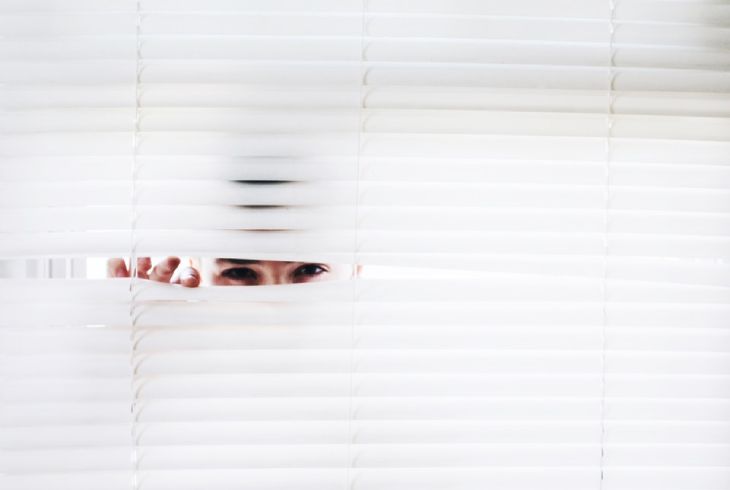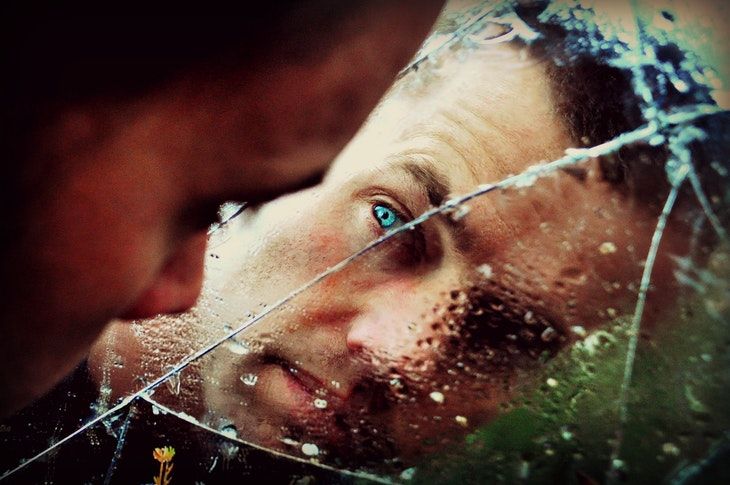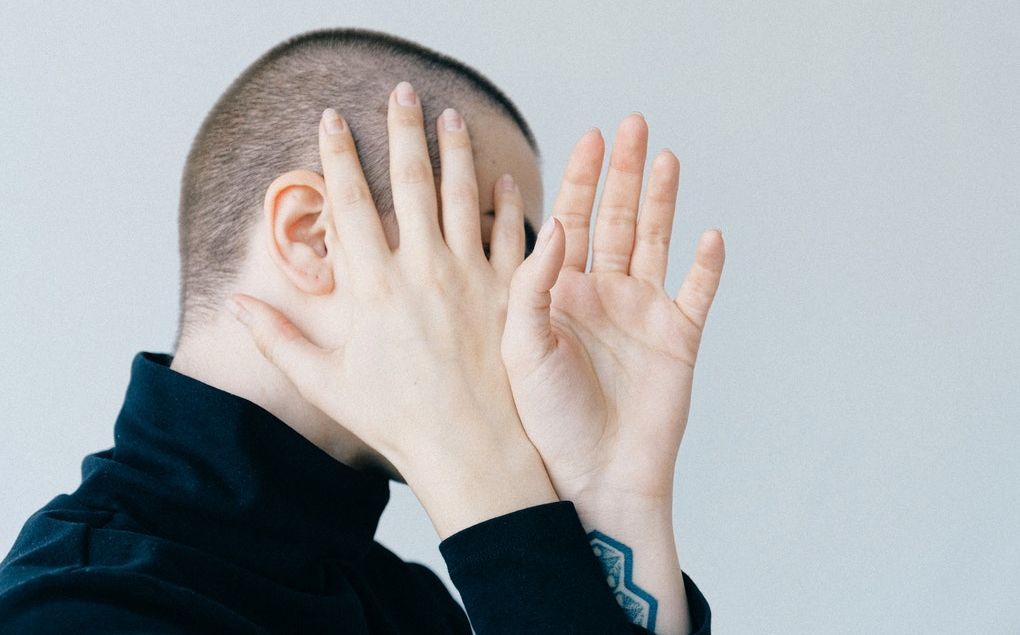I’ve spent most of my life being self-conscious without realizing.
It felt like my awareness was always focused on what other people were thinking about me.
Instead of paying attention to my own reality, I would feel like other people’s needs and wants were more important than mine.
And it created this hyperawareness of how I was being perceived by everyone.
Since discovering what self-consciousness is and realizing the severity of how self-conscious I’d been, I’ve developed a deep understanding of what it means and why it happens.
I’ve also developed practices that help me overcome self-consciousness and live with more presence and inner peace.
In this article I explain how to stop being self-conscious and the steps I’ve taken to break this exhausting habit.
Table of Contents
What is Self-Consciousness
Self-consciousness is a sense that you are being watched by others, usually not in a good way.
Yes, many a time, we can notice people noticing us without it causing us much concern.

But when it causes you to feel like the center of attention or that people are forming negative opinions about you, it can leave you feeling socially anxious and insecure.
I think it’s important to clarify that mild self-consciousness isn’t always negative.
It’s can be healthy to experience moderate levels of self-consciousness and is very human to care what other people think of us.
It only becomes a problem when it causes us to act out of character or feel overly anxious.
Self-Consciousness vs Self-Awareness
This is simple, but often gets mixed up or both get used interchangeably.
Self-awareness is an awareness of you. It is your conscious awareness of yourself, your values, your emotions, your thoughts, your desires, and so on.
Self-awareness is important for leading a positive and happy life and essential for personal and professional growth.
Self-consciousness, however, is how you imagine others perceive you, usually in negitive ways. It is your own opinion of yourself being projected from outside of you back onto you.

It’s not actually what other people think of you, but how you see yourself unconsciously. It’s a projection.
For example, I used to live in a third story building and my kitchen overlooked my neighbors’ kitchen across the street.
I could see into their kitchen, so I assumed they could see into mine. Whenever I was in my kitchen making food, I would feel like they were watching me and judging me.
The problem was, I actually believed they were watching me and that I had some special telepathic powers about what my neighbors thought of me.
It made me feel extremely insecure, because I believed they were judging me based on my own imperfections.
What Causes Us to Feel Self-Conscious?
Healthline states that self-consciousness can be caused by low self-esteem, which makes a lot of sense.
If I had healthy self-esteem, it’s unlikely that I would concern myself with other people’s negative opinions of myself, let alone make assumptions about what they think.
Some other causes:
- Insecurity
- Social anxiety
- Depression
- Borderline personality disorder
Some potential symptoms can include:
- Isolation
- An inferiority complex
- Self-defeating beliefs
- Fear of judgement
- Fear of abandonment
A personal theory of what might contribute to being self-conscious is if a parent puts their needs before their children, to a point where the child feels responsible for the parents’ emotions.
I believe this can condition the child’s mind to focus on the needs of others, and completely abandon their own reality.
How to Stop Being Self Conscious: 7 Tips You Can Start Using Today
1. Retrain Your Mind
If you’ve been getting self-conscious for a long time, realize this; it’s a habit.
And a habit can be broken!
All habits have a trigger, a behavior, and a reward.
The behavior is “being self-conscious” and the reward can be several things:
- Feeling validated
- Feeling needed
- Helping people in need
- Relating and bonding with others
- To stay vigilant and protect ourselves
But if the behavior and the reward are simply focusing on what others are doing or (potentially) thinking in relation to you, then the reward isn’t helpful, because the behavior robs your attention away from your own wants and needs.
To break this pattern, look at what triggers it. When you know the trigger and become aware of it, you can then change the behavior.
Once you’ve practiced this new behavior several times, your mind will adopt this new pattern automatically and replace the feeling of being self conscious.
How do you know what the trigger is?
You raise your self-awareness.
Self-awareness is knowing yourself on a deep level, but it isn’t about being self-absorbed or stops you from considering others.
It’s a practice you can adopt throughout life to notice your own thoughts, beliefs, values, and behavior.
When you develop self-awareness, it helps you reflect on the past, accept the present, and plan for the future.
Being more self-aware will also help you determine what triggers self-consciousness.
A simple practice you can try the next time you’re around people is to be in the present moment. You can do this by focusing on a body part like the surface of your feet or your hands.
You could also focus on your breathing or do a controlled breathing exercise, breathing in slowly for a count of 7 seconds and out for a count of 7.
Then, if or when you get self-conscious, it will be easier to notice what triggered it.
When doing these practices, try to notice what you’re imagining others are thinking about you. Allow any thoughts to arise and let them fade on their own.
Bring your attention back to yourself and focus on your own body and surroundings.
Practice these whenever you feel self-conscious and you’ll gradually break the habit.
2. Memorize a List of Positive Traits About Yourself
Being self-conscious sometimes means you are being self-critical and then believing that’s what other people are thinking about you.
We are often our own worst critics, but it’s often caused by criticisms we’ve picked up from other people’s judgements and expectations, based on their own self-defeating beliefs.
Everyone develops a judgemental inner critic, but some are louder than others.
If you feel like others are judging you, switch your focus onto positive things about yourself.
This might be difficult for some people, as it was for me when I first sought professional help.
It might be easier to write a list of things you imagine others are thinking about you. Whether or not these things are true, they don’t help you think positively about yourself.
Then you can go through your list of things you worry others might think about you and write the opposite or something positive that counteracts the negative.
Ideally, you want to state positive facts about yourself at first, because your mind won’t be able to reject them.
Eventually, you’ll form a more positive opinion about yourself no matter if others disagree with you or not.
If your opinion about yourself makes you feel good, then technically, it is true, and that’s all that matters.
Now, whenever you feel self-conscious, you can recite your positive list of traits in your mind, which switches your focus from what others think and switches off your inner-critic.
3. Practice Self-Acceptance
It gave me a big shock to realize what self-consciousness was, because I thought it was a normal experience to always feel that way.
To find out my attention was placed on the perspectives of what other people were thinking about me caused me a lot of pain.
It made me feel like I had wasted so much of my life not being conscious of my own experience and having what felt like my consciousness being stolen and used by others.
I believed that my purpose for existing was to please others and be at the beck and call of anyone who paid me any attention.
This belief prevented me from acknowledging my own existence, and the realization brought up a lot of shame and regret.
But experiencing these negative feelings was just the beginning of finding more freedom and is where self-acceptance comes in.
Without self-acceptance, change is impossible.
When we disregard parts of who we are, we hold them deep inside our unconscious mind and reject anything that may cause us to look at these parts.
For example, when I was a child, my father would call me stupid, which made me feel inadequate.
When I grew up and discovered things I was interested in, I would learn about them, but be afraid to share what I knew in the fear that someone would tell me I was wrong.
I was afraid to form an opinion, in case I was wrong. If I ever shared anything of myself, an opinion, or idea, I would always feel shut down by someone disagreeing with me.
Self-acceptance is the practice of allowing how we think, feel, believe, and act as valid. They might not be true or empower us, but we accept that is what our experience is from moment to moment.
We may have felt like our reality was invalided by our parents, friends, or teachers, but as an adult, we can bring our attention to everything we experience and accept everything as it is right now.
It’s the practice of not rejecting or judging ourselves and allowing whatever comes up to be there so we can let it go if it no longer serves us.
4. Realize Others Are More Concerned About Themselves
If your awareness is constantly focused on what others are thinking of you, then it is likely a programmed response that has been habitual to you since childhood.
Instead of caring what others might think, realize that most people are more concerned about themselves.
Everyone has their own problems, insecurities, and anxieties. Even those who come across as confident and secure.
The difference between self-conscious people and unselfconscious people is that unselfconscious people focus on their positive opinions of themself and self-conscious people only have negative opinions of themself.
But even the most secure people will experience self-doubt and insecure thinking from time to time.
Realize that 99% of the time, no one is thinking about you. Most people are thinking about their own struggles and insecurities.
5. Start Putting Yourself First
If you are constantly projecting your awareness on other people’s concerns, you are neglecting your own problems, desires, and ability to grow.
When aboard an air flight, if oxygen masks are deployed, why are adults told to place them on themselves before children or others?
Because, if the adult loses consciousness while seeing to everyone else’s masks, they won’t be able to help as many people because they didn’t put their mask on first.
Some people are so insecure that they fear others will think they are selfish for taking care of themself first.
It is not selfish or shameful to take care of yourself first; it is your birthright. If other people tell you otherwise, it is those people who are selfish.
Some people have a hard time accepting this and still place the mask on others before themself.
If your focus is always on other people and never focusing on changing your life, you could be resistant to changing your own situation and believing you’ll only feel better when everyone around you is okay.
Leading a life of trying to please others or see to their needs before your own will inevitably lead to disappointment and an unfulfilled life.
- You do not exist to take care of others (unless you choose to take care of people)
- You are not responsible for other people’s problems
- Realize you’re not responsible for other people (unless you’re a parent)
- You’re only responsible for yourself
If the idea of taking care of your own needs causes feelings of shame and guilt, you could suffer from codependency.
6. Set Some Internal Boundaries for Yourself
Boundaries are essential to your own personal happiness and to build trust in relationships.
If you are overly self-conscious, maybe you’re afraid of others intruding on your personal space or asking you to do things you don’t want to do.
If you have a hard time saying no to people, this is a clear sign of people pleasing.
When you agree to do things you don’t want to do, you are violating your own internal boundaries and this creates inner conflict.
If you assert your boundaries in a nonaggressive way, you are communicating with the other person with authenticity, which should honor respect from the other person.
However, if the other person gets defensive and aggressive with you, then conflict happens outside yourself.
Instead of the conflict being internal and causing more reasons to feel self-conscious and afraid of people, the conflict exists within the relationship.
This can then be resolved adultly, where you can both come to some mutual agreement that satisfies both your needs.
7. Talk to a Therapist
Therapy can often help you deal with mental health issues if you have been struggling for a while and don’t know where to turn.
You might be successful seeing a counselor, psychologist, or CBT practitioner to help you understand why you might experience self-consciousness.
If you would prefer not to see someone in person, then you could try an online service or app like BetterHelp.
BetterHelp is a service that matches you with a licensed and professional therapist who can help you with a wide range of issues, including depression, anxiety, relationships, trauma, grief, and more.
You can also choose how you communicate with a therapist, either through messaging, chat, phone, or video.
Learn more about BetterHelp here.
8. Try Self Hypnosis
I have tried this self-consciousness hypnosis audio from Hypnosis Downloads with great success.
The audio explains a little about what it means to be self-conscious and then hypnotically sends you into deep relaxation to help you calm your mind.
Hypnosis is completely safe and feels similar to when you are drifting off to sleep. It’s extremely calming and healing.
This self-conscious hypnosis is around 23 minutes long and can take effect on a deep unconscious level, without needing you to pay conscious effort.
Download the hypnosis here to feel better today.
Final Thoughts
That concludes this article on how to stop being self conscious. I hope you found this insightful.
It truly is an unpleasant experience to feel conscious of yourself and worry what others are thinking of you all the time.
With some practice, you can start to shift your awareness onto yourself and feel much better about who you really are.
Photo by Anna Shvets from Pexels

Amazing article! Thank you so much! I struggle with rumination, most of it worrying about how I might have come across (past), or what others think of me (present). I’m aware it’s irrational and do my best to not think about it, but at times it’s difficult to stop myself and re-center. Understanding that what I think others think is still what I think – and that what they think doesn’t matter anyway – is exactly what I needed to read! Thank you!
Thank you for your comment Nicole, I really appreciate it and your perspective!
I’m so glad you found the article helpful.
Best wishes, Steve.